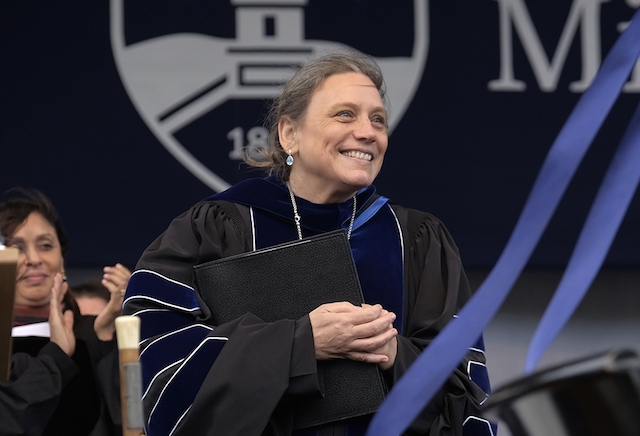Laurie L. Patton Inaugurated as 17th President of Middlebury

Middlebury opened a new chapter in its 215-year history on Sunday, October 11 with the inauguration and celebration of its 17th president, Laurie L. Patton, on a splendid fall morning punctuated by gusty winds and sunny skies.
More than 1,000 people gathered in the quadrangle on the west side of Old Chapel on the Middlebury College campus to bear witness to history and absorb the words of the new president and several others as autumnal colors emanated from the maples, beeches, and hickory trees surrounding the pastoral scene.
Marna C. Whittington, the chair of the Middlebury Board of Trustees, conducted the investiture of the new president and presented Gamaliel Painter’s cane to her, which was the walking stick carried by one of the College’s founders and by every president thereafter. One of those presidents, John M. McCardell Jr., Middlebury’s 15th, returned to the community he called home for more than three decades to present the traditional pewter medallion to the newest president—and first woman to hold the office.
After a standing ovation, the first of two she would receive on this memorable occasion, President Patton delivered her 35-minute inaugural address. She described what she has come to see as “that determined, engaged optimism” that lies at the heart of the institution; the vital role played by the mountains, both Green and Adirondack, in shaping the community; the challenge to have “more and better arguments with greater respect, stronger resilience, and deeper wisdom”; and her five thoughts about a vision for the future.
From Vermont to California, and at Middlebury’s sites around the globe, the first three months of Laurie Patton’s tenure have been marked by her humility, her passion, her scholarship, and her active-listening skills. (Her official start date was on July 1, 2015.) And in her inaugural address she displayed all of those qualities, first when she recognized Butch Varno in the audience. Not a student, an alumnus, or an employee, Varno is a disabled resident of Middlebury who has been “picked up” and transported to home athletic contests and major events by members of the football and basketball teams for the past 55 years.
Patton connected the optimism of Middlebury’s people to the mountains that flank it to the east and west.
“These mountains call all of us to be bigger in our aspirations and yet also to be smaller and linked to a larger cause. Middlebury’s mountains give us a sense of place that is also a sense of community,” she said. “The mountains help us find our place in the world, and even if we don’t find it immediately, we have a deep and abiding trust that we will. This is the strength of the hills.”
She likened the mountains’ effect on the Vermont campus to the ocean’s effect on the Middlebury Institute of International Studies at Monterey where the Pacific lends “perspective and sense of the larger picture.”
Middlebury is distinct from other liberal arts institutions, Patton said, in its heritage of open mindedness, its aspirations, its schools and programs, its exuberance, and in “our love and care for languages and writing and sciences and society and arts and athletics all at the same time.”
Middlebury has one more distinctive feature – “our capacity to argue and be resilient in those arguments” – and it was upon this facet of the Middlebury persona that the new president devoted the majority of her talk. As Patton so often does in her public addresses, she rooted her central thesis on an ancient text or concept, in this instance on the Jewish tradition of “argument for the sake of heaven.”
Patton traced the role that argumentation has played in the development of Middlebury over the past 215 years, and urged the community to be thinking how today’s arguments will be viewed by Middlebury citizens 100 years from now.
“I hope we are all thinking about that, because I believe that Middlebury’s collective genius of warmth, optimism, rigor, and compassion can make us some of the best arguers in higher education – arguers who can think together with deeper respect, stronger resilience, and greater wisdom.”
In her vision for Middlebury, Patton mapped out five points of focus, including what it means to be global, looking beyond carbon neutrality, a better understanding of the idea of diversity, the role of identity in human relationships, and how to understand the larger Middlebury of today with its many schools and programs.
Patton’s inaugural address was met with thunderous applause and a second standing ovation.
Guest speakers at the inauguration included Natasha Trethewey, the U.S. poet laureate, who read her poem “Illumination.” The winner of the 2007 Pulitzer Prize for poetry is a former colleague of Laurie Patton’s — they taught together on the faculty at Emory University. Trethewey, who has also served as a faculty member at the Middlebury Bread Loaf Writers’ Conference, read one of President Patton’s poems “On Learning Sacred Language in Childhood.”
Richard Brodhead, president of Duke University, and James Douglas ’72, former governor of Vermont and Middlebury executive in residence, also served as guest speakers.
Brodhead saluted Patton as “an active and continuous learner. When you are in Laurie’s company, her way of engaging you animates you, such that your thoughts become more interesting. She actively listens, takes your ideas in, and allows them to release thoughts of her own, in a free-form synthesis that’s always opening new vistas.”
“Laurie Patton is a skilled administrator, but her real claim to the office entrusted to her today is that she is a natural leader in this sense,” continued Brodhead. “Building on your best thought, she will help a great liberal arts college make a profound case for the liberal arts, without being afraid to try new things or adapt to a new circumstances. Let’s be frank: she has one downside, and you have probably already discovered it. Whatever you do, she’ll work twice as hard as you.
“A half-baked remark from you will receive a super-thoughtful reply from her; and she will still be up answering messages long after you have folded your tent. The consolation is that with Laurie Patton around, you will never doubt that education is a source of energy, inspiration, fellowship and fun.”
Governor Douglas quoted President Reagan: “The greatest leader is not…the one who does the greatest things, [but] the one [who] gets [others] to do the greatest things,” and added, “I’m confident that we have such a leader [in] President Patton.”
Messages of celebration and welcome to Laurie Patton were delivered on the platform by: Susan Baldridge, provost of Middlebury; Jason Merrill ’90, director of the Kathryn Wasserman Davis School of Russian on behalf of the Middlebury Language Schools; Laura Burian, professor of translation and interpretation on behalf of the Middlebury Institute of International Studies at Monterey; and Roberto Lint Sagarena, director of the Center for the Comparative Study of Race and Ethnicity.
Also representing the Middlebury Institute at the inaugural ceremony was Vice President for Academic Affairs and Dean of the Institute Jeff Dayton-Johnson.
With reporting by Robert Keren, Photos by Brett Simison.
For More Information
Jason Warburg
jwarburg@middlebury.edu
831.647.3156
Eva Gudbergsdottir
eva@middlebury.edu
831.647.6606

